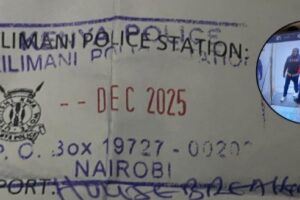Deputy Inspector General of Police Eliud Lagat has made his first public appearance on official duty since his controversial reinstatement.
His return comes just months after the death of teacher and blogger Albert Ojwang in police custody, a case many still believe is directly linked to Lagat’s actions.
Lagat was seen leading a high-level security assessment in Mandera and Wajir counties, where he addressed issues such as intercommunal conflicts and terrorism threats from groups like Al-Shabaab.
He reassured local leaders that police would increase deployments and work to strengthen security in the region.
However, for many Kenyans, his return to duty is a painful reminder of the unanswered questions surrounding Ojwang’s death.
Albert Ojwang, a 31-year-old teacher from Homa Bay County, was known for his outspoken criticism of corruption and police misconduct on social media.
In early June 2025, he allegedly posted content accusing Lagat of involvement in bribe collection by traffic police.
On June 7, he was arrested in his village and transferred over 350 kilometers to Nairobi’s Central Police Station. The following day, he was found dead in his cell.
While police initially claimed suicide, an autopsy revealed he died from blunt force trauma, suggesting he had been assaulted.
His widow and family described severe injuries, saying he looked like he had been tortured.
News of Ojwang’s death quickly led to protests across the country, demanding justice and an end to police brutality.
Some demonstrations turned violent, with police using tear gas and live bullets, resulting in more casualties.
Lagat announced he was stepping aside for investigations, but it was later revealed this was just an 18-day leave.
The High Court later allowed his return to office, a decision that angered activists and Ojwang’s family, who saw it as protecting a senior officer from accountability.
Lagat’s role as the complainant in the defamation case against Ojwang has drawn criticism, with many arguing that without his involvement, Ojwang might still be alive.
Public figures, including Nyali MP Mohammed Ali, have called for his removal and prosecution. Social media platforms remain active with calls for protests until Lagat is held accountable.
IPOA has arrested and charged some lower-ranking officers in the case, but Lagat remains free and continues with his official duties.
Ojwang’s family continues to speak out about their loss, while protests in June left at least 41 more people dead.
The big question of whether justice will be served remains unanswered. For many Kenyans, his reinstatement is a symbol of the broader struggle against impunity within the police force.





















Add Comment